
Stringed instrument tunings
Encyclopedia
This is a list of tunings for stringed musical instruments. Strings
or courses
are listed from low to high pitch
, reading from left to right facing the front of the instrument standing vertically. (There are a few exceptions to this, for instance the mountain dulcimer which is strung in the reverse direction, with the highest sounding courses on the left and the lowest to the right.) Octaves, where shown, are given in scientific pitch notation
, where the A above middle C
is "A4."
Single-string courses are simply separated by spaces; multiple-string courses (i.e., paired or tripled strings) are shown with the courses separated by bullet characters (•).

Strings (music)
A string is the vibrating element that produces sound in string instruments, such as the guitar, harp, piano, and members of the violin family. Strings are lengths of a flexible material kept under tension so that they may vibrate freely, but controllably. Strings may be "plain"...
or courses
Course (music)
A course is a pair or more of adjacent strings tuned to unison or an octave and usually played together as if a single string. It may also refer to a single string normally played on its own on an instrument with other multi-string courses, for example the bass string on a nine string baroque...
are listed from low to high pitch
Pitch (music)
Pitch is an auditory perceptual property that allows the ordering of sounds on a frequency-related scale.Pitches are compared as "higher" and "lower" in the sense associated with musical melodies,...
, reading from left to right facing the front of the instrument standing vertically. (There are a few exceptions to this, for instance the mountain dulcimer which is strung in the reverse direction, with the highest sounding courses on the left and the lowest to the right.) Octaves, where shown, are given in scientific pitch notation
Scientific pitch notation
Scientific pitch notation is one of several methods that name the notes of the standard Western chromatic scale by combining a letter-name, accidentals, and a number identifying the pitch's octave...
, where the A above middle C
Middle C
C or Do is the first note of the fixed-Do solfège scale. Its enharmonic is B.-Middle C:Middle C is designated C4 in scientific pitch notation because of the note's position as the fourth C key on a standard 88-key piano keyboard...
is "A4."
Single-string courses are simply separated by spaces; multiple-string courses (i.e., paired or tripled strings) are shown with the courses separated by bullet characters (•).

A
| Instrument | Tuning | Strings & Courses | Alternative Names | Origin | Notes | Picture |
|---|---|---|---|---|---|---|
| Archlute Archlute The archlute is a European plucked string instrument developed around 1600 as a compromise between the very large theorbo, the size and re-entrant tuning of which made for difficulties in the performance of solo music, and the Renaissance tenor lute, which lacked the bass range of the theorbo... |
F1 F2 • G1 G2 • A1 A2 • B1 B2 • C2 C3 • D2 D3 • E2 E3 • F2 F3 • G2 G2 • C2 C2 • F3 F3 • A3 A3 • D4 D4 • G4 |
27 strings/14 courses | Arciliuto, Erzlaute. | Europe | ||
| Akkordolia | F2 • A2 • C3 • F3 | 4 strings/4 courses | Akkordolia in Germany & Austria, Taishogoto in Japan, Bulbul-tarang in India and Benju in Pakistan | Germany & Austria / Japan / India / Pakistan | Standard tuning |
B
| Instrument | Tuning | Strings & Courses | Alternative Names | Origin | Notes | Picture |
|---|---|---|---|---|---|---|
| Baglamas | D4 D5 • A4 A4 • D5 D5 | 6 strings/3 courses | Balgama, Balgama Saz, Baglamadaki | Greece | Modal D standard tuning | |
| Bajo quinto | A2 A1 • D3 D2 • G2 G2 • C3 C3 • F3 F3 | 10 strings/5 courses | Mexico | Standard tuning. | ||
| Bajo Sexto Bajo sexto A bajo sexto is a musical instrument with 12 strings in 6 double courses, used in Mexican music. It is used primarily in norteño music of northern Mexico and across the border in the music of south Texas known as "Tex-Mex", "conjunto, or "música mexicana-tejana".A similar instrument with five... |
E2 E1 • A2 A1 • D3 D2 • G2 G2 • C3 C3 • F3 F3 | 12 strings/6 courses | Mexico | Standard tuning | ||
| Balalaika Balalaika The balalaika is a stringed musical instrument popular in Russia, with a characteristic triangular body and three strings.The balalaika family of instruments includes instruments of various sizes, from the highest-pitched to the lowest, the prima balalaika, secunda balalaika, alto balalaika, bass... |
E E A | 3 strings/3 courses | Russia | Standard alto tuning | ||
| Balalaika Balalaika The balalaika is a stringed musical instrument popular in Russia, with a characteristic triangular body and three strings.The balalaika family of instruments includes instruments of various sizes, from the highest-pitched to the lowest, the prima balalaika, secunda balalaika, alto balalaika, bass... |
E A D | 3 strings/3 courses | Russia | Standard bass tuning | ||
| Balalaika Balalaika The balalaika is a stringed musical instrument popular in Russia, with a characteristic triangular body and three strings.The balalaika family of instruments includes instruments of various sizes, from the highest-pitched to the lowest, the prima balalaika, secunda balalaika, alto balalaika, bass... |
E A D | 3 strings/3 courses | Russia | Standard contrabass tuning | ||
| Balalaika Balalaika The balalaika is a stringed musical instrument popular in Russia, with a characteristic triangular body and three strings.The balalaika family of instruments includes instruments of various sizes, from the highest-pitched to the lowest, the prima balalaika, secunda balalaika, alto balalaika, bass... |
E E A | 3 strings/3 courses | Russia | Standard piccolo tuning | ||
| Balalaika Balalaika The balalaika is a stringed musical instrument popular in Russia, with a characteristic triangular body and three strings.The balalaika family of instruments includes instruments of various sizes, from the highest-pitched to the lowest, the prima balalaika, secunda balalaika, alto balalaika, bass... |
E E A | 3 strings/3 courses | Russia | Standard prima tuning | ||
| Balalaika Balalaika The balalaika is a stringed musical instrument popular in Russia, with a characteristic triangular body and three strings.The balalaika family of instruments includes instruments of various sizes, from the highest-pitched to the lowest, the prima balalaika, secunda balalaika, alto balalaika, bass... |
C E G | 3 strings/3 courses | Russia | Folk tuning | ||
| Bandola Andina Colombiana Bandola This article refers to various South American instruments. Bandola is also Portuguese for Mandola.The Bandola is one oif many varieties of small pear-shape chordophones found in Venezuela and Colombia... |
F3 F3 • B3 B3 • E4 E4 E4 • A4 A4 A4 • D5 D5 D5 • G5 G5 G5 |
16 strings/6 courses | Colombia | Standard tuning | ||
| Bandola Llanera | A2 D3 A3 E4 | 4 strings/4 courses | Venezuela | Standard tuning | ||
| Bandola Oriental | G3 G3 • D4 D4 • A4 A4 • E5 E5 | 4 strings/4 courses | Venezuela | Standard tuning | ||
| Bandolin | E5 E4 E5 • A5 A4 A5 • D5 D5 D5 • F#5 F#5 F#5 • B5 B5 B5 | 15 strings/6 courses | Ecuador | Standard tuning | ||
| Bandurria Bandurria The bandurria is a plectrum chordophone from Spain, similar to the cittern and the mandolin, primarily used in Spanish folk music.Prior to the 18th century, the bandurria had with a round back, similar or related to the mandore. It had become a flat-backed instrument by the 18th century, with five... |
G G • C C • F F • B B • E E • A A |
12 strings/6 courses | Spain | Spanish tuning. One octave higher than the laud. |
 |
|
| banjo, bass Bass banjo There are multiple instruments referred to as a bass banjo. The first to enter real production was the five-string cello banjo, tuned one octave below a five-string banjo. This was followed by a four-string cello banjo, tuned CGDA in the same range as a cello or mandocello, and modified upright... |
E1 A1 D2 G2 | 4 strings/4 courses | USA | A cello banjo is sometimes called a "bass banjo", but there are true bass banjos as well. | ||
| banjo, cello Bass banjo There are multiple instruments referred to as a bass banjo. The first to enter real production was the five-string cello banjo, tuned one octave below a five-string banjo. This was followed by a four-string cello banjo, tuned CGDA in the same range as a cello or mandocello, and modified upright... |
C2 G2 D3 A3 | 4 strings/4 courses | bass banjo | USA | Standard tuning. Same as cello and mandocello | |
| Banjo Banjo In the 1830s Sweeney became the first white man to play the banjo on stage. His version of the instrument replaced the gourd with a drum-like sound box and included four full-length strings alongside a short fifth-string. There is no proof, however, that Sweeney invented either innovation. This new... (Long Neck) |
G4 B2 E3 G#3 B3 | 5 strings/5 courses | "Pete Seeger" Banjo | USA (commissioned by Pete Seeger) | Open string tuning; often played with capo on 3rd fret | |
| Banjo Banjo In the 1830s Sweeney became the first white man to play the banjo on stage. His version of the instrument replaced the gourd with a drum-like sound box and included four full-length strings alongside a short fifth-string. There is no proof, however, that Sweeney invented either innovation. This new... ,tenor |
C3 G3 D4 A4 | 4 strings/4 courses | USA | USA via Africa | Standard tenor jazz tuning | |
| Banjo Banjo In the 1830s Sweeney became the first white man to play the banjo on stage. His version of the instrument replaced the gourd with a drum-like sound box and included four full-length strings alongside a short fifth-string. There is no proof, however, that Sweeney invented either innovation. This new... , tenor |
G2 D3 A3 E4 | 4 strings/4 courses | USA via Africa | Irish tenor tuning | ||
| Banjo Banjo In the 1830s Sweeney became the first white man to play the banjo on stage. His version of the instrument replaced the gourd with a drum-like sound box and included four full-length strings alongside a short fifth-string. There is no proof, however, that Sweeney invented either innovation. This new... (5-string) |
G4 D3 G3 B3 D4 | 5 strings/5 courses | Bluegrass Banjo | USA via Africa | Open G tuning |  |
| Banjo Banjo In the 1830s Sweeney became the first white man to play the banjo on stage. His version of the instrument replaced the gourd with a drum-like sound box and included four full-length strings alongside a short fifth-string. There is no proof, however, that Sweeney invented either innovation. This new... (5-string) |
G4 C3 G3 B3 D4 | 5 strings/5 courses | 5 strings/5 courses | C tuning |  |
|
| Banjo Banjo In the 1830s Sweeney became the first white man to play the banjo on stage. His version of the instrument replaced the gourd with a drum-like sound box and included four full-length strings alongside a short fifth-string. There is no proof, however, that Sweeney invented either innovation. This new... , plectrum |
C3 G3 B3 D4 | 4 strings/4 courses | USA via Africa | Standard plectrum tuning | ||
| Bisernica | EE A D G | 5 strings/5 courses | Croatia, Serbia, Hungary, Slovenia | 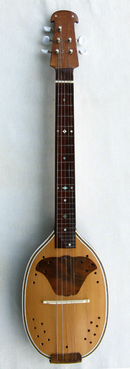 |
||
| Bordonua Bordonua The Bordonua is a large, deep body bass guitar which is native to Puerto Rico. They are made using several different shapes and sizes.... |
A2 A3 • D4 D3 • F3 F4 • B3 B3 • E4 E4 |
10 strings/5 courses | Puerto Rico | |||
| Bouzouki Bouzouki The bouzouki , is a musical instrument with Greek origin in the lute family. A mainstay of modern Greek music, the front of the body is flat and is usually heavily inlaid with mother-of-pearl. The instrument is played with a plectrum and has a sharp metallic sound, reminiscent of a mandolin but... |
C3 C4 • F3 F4 • A3 A3 • D4 D4 | 8 strings/4 courses | Tetrachordo bouzouki | Greece | Standard F6 tuning | 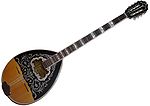 |
| Bouzouki Bouzouki The bouzouki , is a musical instrument with Greek origin in the lute family. A mainstay of modern Greek music, the front of the body is flat and is usually heavily inlaid with mother-of-pearl. The instrument is played with a plectrum and has a sharp metallic sound, reminiscent of a mandolin but... |
D3 D4 • A3 A3 • D4 D4 | 6 strings/3 courses | Trichordo bouzouki | Greece | Standard F6 tuning |  |
| Bouzouki, Irish Irish bouzouki The Irish bouzouki is a development of the octave mandolin adapted for Irish traditional and other folk music from the late 1960s onward.-Adoption for Celtic music:... |
G3 G2 • D4 D3 • A3 A3 • D4 D4 | 8 strings/4 courses | zouk | Ireland | Irish tuning (octaves) | 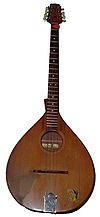 |
| Bouzouki, Irish Irish bouzouki The Irish bouzouki is a development of the octave mandolin adapted for Irish traditional and other folk music from the late 1960s onward.-Adoption for Celtic music:... |
G3 G2 • D4 D3 • A3 A3 • E4 E4 | 8 strings/4 courses | " | " | "Mandolin" tuning (octaves can also be tuned in unison) |  |
| Bouzouki, Irish Irish bouzouki The Irish bouzouki is a development of the octave mandolin adapted for Irish traditional and other folk music from the late 1960s onward.-Adoption for Celtic music:... |
G2 G2 • D3 D3 • A3 A3 • E4 E4 | 8 strings/4 courses | " | " | "Mandolin" tuning (unison pairs) |  |
| Bouzouki, Irish Irish bouzouki The Irish bouzouki is a development of the octave mandolin adapted for Irish traditional and other folk music from the late 1960s onward.-Adoption for Celtic music:... |
A3 A2 • D4 D3 • A3 A3 • D4 D4 | 8 strings/4 courses | " | " | Modal D tuning (octaves can also be tuned in unison) |  |
| Brac | E A D GG | 5 strings/4 courses | Basprim, Brach | Croatia, Serbia, Slovenia | ||
| Braguinha | D B G D | 4 strings/4 courses | Braguinã, Machete de braga | Medeira, Portugal | ||
| Bugarija | G B D GG | 5 strings/4 courses | Kontra | Croatia, Serbia, Slovenia |
C
| Instrument | Tuning | Strings & Courses | Alternative Names | Origin | Notes | Picture |
|---|---|---|---|---|---|---|
| Cak Kroncong Kroncong is the name of a ukulele-type instrument and an Indonesian musical style that typically makes use of the kroncong , the band or combo or ensemble consist of a flute, a violin, a melody guitar, a cello in pizzicato style, string bass also in... |
D5 D5 • G4 • B4 | 4 strings/3 courses | Steel Kroncong guitar | Indonesia | Standard tuning | |
| Cuk Kroncong Kroncong is the name of a ukulele-type instrument and an Indonesian musical style that typically makes use of the kroncong , the band or combo or ensemble consist of a flute, a violin, a melody guitar, a cello in pizzicato style, string bass also in... |
G4 • B3 • E3 | 3 strings/3 courses | Nylon Kroncong guitar | Indonesia | Standard tuning | |
| Cavaquinho Cavaquinho The cavaquinho is a small string instrument of the European guitar family with four wire or gut strings. It is also called machimbo, machim, machete , manchete or marchete, braguinha or braguinho, or cavaco.The most common tuning is D-G-B-D ; other tunings include D-A-B-E... |
D G B D | 4 strings/4 courses | Cavaco | Portugal | Standard tuning | |
| Cavaquinho Cavaquinho The cavaquinho is a small string instrument of the European guitar family with four wire or gut strings. It is also called machimbo, machim, machete , manchete or marchete, braguinha or braguinho, or cavaco.The most common tuning is D-G-B-D ; other tunings include D-A-B-E... |
D G B E | 4 strings/4 courses | Cavaco | Portugal | 'Guitar' tuning | |
| Cavaquinho Cavaquinho The cavaquinho is a small string instrument of the European guitar family with four wire or gut strings. It is also called machimbo, machim, machete , manchete or marchete, braguinha or braguinho, or cavaco.The most common tuning is D-G-B-D ; other tunings include D-A-B-E... |
G G B D | 4 strings/4 courses | Cavaco | Portugal | Alternative tuning | |
| Cavaquinho Cavaquinho The cavaquinho is a small string instrument of the European guitar family with four wire or gut strings. It is also called machimbo, machim, machete , manchete or marchete, braguinha or braguinho, or cavaco.The most common tuning is D-G-B-D ; other tunings include D-A-B-E... |
A A C E | 4 strings/4 courses | Cavaco | Portugal | Alternative tuning | |
| Cello Cello The cello is a bowed string instrument with four strings tuned in perfect fifths. It is a member of the violin family of musical instruments, which also includes the violin, viola, and double bass. Old forms of the instrument in the Baroque era are baryton and viol .A person who plays a cello is... |
C2 G2 D3 A3 | 4 strings/4 courses | Violoncello | Europe | Standard tuning |  |
| Cello Cello The cello is a bowed string instrument with four strings tuned in perfect fifths. It is a member of the violin family of musical instruments, which also includes the violin, viola, and double bass. Old forms of the instrument in the Baroque era are baryton and viol .A person who plays a cello is... |
C2 G2 D3 G3 | 4 strings/4 courses | Violoncello | Europe | "5th Suite" tuning |  |
| Cello Cello The cello is a bowed string instrument with four strings tuned in perfect fifths. It is a member of the violin family of musical instruments, which also includes the violin, viola, and double bass. Old forms of the instrument in the Baroque era are baryton and viol .A person who plays a cello is... |
B1 F2 D3 A3 | 4 strings/4 courses | Violoncello | Europe | "Zoltán Kodály Zoltán Kodály Zoltán Kodály was a Hungarian composer, ethnomusicologist, pedagogue, linguist, and philosopher. He is best known internationally as the creator of the Kodály Method.-Life:Born in Kecskemét, Kodály learned to play the violin as a child.... " tuning |
 |
| Cetera | cc dd e#e# ff gg gg dd gg | 16 strings/8 courses | Corsica, France. | 8 course tuning |  |
|
| Chapey Chapey The chapey is a plucked string instrument from Cambodia. It has two double courses of nylon strings.... |
F3 F3 • B3 | 3 strings/2 courses | Cambodia | Standard 3 string tuning | ||
| Charango Charango The charango is a small Andean stringed instrument of the lute family, 66 cm long, traditionally made with the shell of the back of an armadillo. Primarily played in traditional Andean music, and is sometimes used by other Latin American musicians. Many contemporary charangos are now made with... |
G4 G4 • C5 C5 • E5 E4 • A4 A4 • E5 E5 | 10 strings/5 courses | Quirquincho, Mulita, Tatu, Kirki | Bolivia, Peru, Argentina Chile, Ecuador |
Standard C6 tuning. 3rd course is an octave pair. |  |
| Charangon Charangon The Charangón is a small lute-like fretted stringed instrument, of the charango family.Its general shape and construction are very similar to the charango, but it is larger and is typically pitched 3 or 4 diatonic intervals lower than a standard charango.The overall length varies from 70 to 80 cm,... |
C4 C4 • F4 F4 • A5 A4 • D5 D5 • A5 A5 | 10 strings/5 courses | Baritone Charango | Andean Region | F6 tuning | |
| Charangon Charangon The Charangón is a small lute-like fretted stringed instrument, of the charango family.Its general shape and construction are very similar to the charango, but it is larger and is typically pitched 3 or 4 diatonic intervals lower than a standard charango.The overall length varies from 70 to 80 cm,... |
D4 D4 • G4 G4 • B5 B4 • E5 E5 • B5 B5 | 10 strings/5 courses | Baritone Charango | Andean region | G6 tuning | |
| Chonguri Chonguri The chonguri is a plucked string musical instrument from Georgia. It has 4 nylon strings.-Choghur:The choghur dates back to the 12th to 16th centuries, the period between the gopuz and the saz. In the Caucasus, Iran and Anatolia, and in Sufi traditions, darvishes and ashugs used an instrument... |
D F d A | 4 strings/4 courses | Georgia | Standard tuning | ||
| Chitarra battente Chitarra battente The chitarra battente also known as "chitarra italiana" is a musical instrument, a chordophone of the lute family. At a casual glance, it is similar to the everyday classical guitar, but larger and typically strung with four steel strings... |
A3 A3 • D4 D4 • G3 G3 • B3 B3 • E4 E4 | 10 strings/5 courses | Italy | Standard tuning | ||
| Çiftelia Çiftelia The Çifteli is an Albanian wooden, largely acoustic string instrument, with only two strings .The çifteli is commonly used by Albanian folk musicians as well as other modern musicians and is played by Albanians at weddings, concerts, national events, and other occasions... |
B3 E3 | 2 strings/2 courses | Albania | Common tuning |  |
|
| Cinco Y Medio | A4 A3 • D3 • F#4 • B4 • E4 | 6 strings/5 courses | North-western Venezuela | El Tocuyo tuning | ||
| Cinco Y Medio | E3 • A3 • D3 • F#4 • B4 • E4 | 6 strings/6 courses | North-western Venezuela | Sanara tuning | ||
| Cittern Cittern The cittern or cither is a stringed instrument dating from the Renaissance. Modern scholars debate its exact history, but it is generally accepted that it is descended from the Medieval Citole, or Cytole. It looks much like the modern-day flat-back mandolin and the modern Irish bouzouki and cittern... |
CC • GG • DD • AA • DD | 10 strings/5 courses | Celtic or Flatback Cittern | Europe | Mandocello tuning |  |
| Cittern Cittern The cittern or cither is a stringed instrument dating from the Renaissance. Modern scholars debate its exact history, but it is generally accepted that it is descended from the Medieval Citole, or Cytole. It looks much like the modern-day flat-back mandolin and the modern Irish bouzouki and cittern... |
CC • GG • DD • AA • EE | 10 strings/5 courses | Celtic or Flatback Cittern | Europe | Mandolin low 'C' tuning |  |
| Cittern Cittern The cittern or cither is a stringed instrument dating from the Renaissance. Modern scholars debate its exact history, but it is generally accepted that it is descended from the Medieval Citole, or Cytole. It looks much like the modern-day flat-back mandolin and the modern Irish bouzouki and cittern... |
DD • GG • DD • AA • DD | 10 strings/5 courses | Celtic or Flatback Cittern | Europe | Irish tuning |  |
| Cittern Cittern The cittern or cither is a stringed instrument dating from the Renaissance. Modern scholars debate its exact history, but it is generally accepted that it is descended from the Medieval Citole, or Cytole. It looks much like the modern-day flat-back mandolin and the modern Irish bouzouki and cittern... |
DD • AA • DD • AA • DD | 10 strings/5 courses | Celtic or flatback cittern | Europe | Modal D tuning. There are also many other modal tunings. See the cittern page for more information. |  |
| Cittern Cittern The cittern or cither is a stringed instrument dating from the Renaissance. Modern scholars debate its exact history, but it is generally accepted that it is descended from the Medieval Citole, or Cytole. It looks much like the modern-day flat-back mandolin and the modern Irish bouzouki and cittern... |
GG • DD • AA • EE • BB | 10 strings/5 courses | Celtic or flatback cittern | Europe | Mandolin High 'B' tuning |  |
| Crwth Crwth The crwth is an archaic stringed musical instrument, associated particularly with Welsh music, once widely-played in Europe.-Origin of the name:... |
G2 • C3 • C2 • D2 • D3 | 5 strings/5 courses | Wales | Traditional Welsh tuning | 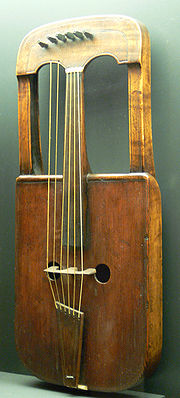 |
|
| Cuatro Cuatro (instrument) The cuatro is any of several Latin American instruments of the guitar or lute family. The cuatro is smaller than a guitar. Cuatro means four in Spanish, although current instruments may have more than four strings.... |
B3 B2 • E4 E3 • A3 A3 • D4 D4 • G4 G4 |
10 strings/5 courses | Puerto Rico | Standard tuning | ||
| Cuatro Cuatro (instrument) The cuatro is any of several Latin American instruments of the guitar or lute family. The cuatro is smaller than a guitar. Cuatro means four in Spanish, although current instruments may have more than four strings.... |
A3 D4 F4 B3 | 4 strings/4 courses | Venezuela | Standard D6 tuning | 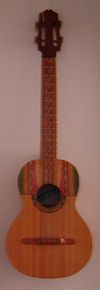 |
|
| Cümbüş Cümbüs The cümbüş is a Turkish stringed instrument of relatively modern origin. Developed in the early 20th century by Zeynelabidin Cümbüş as an oud-like instrument that could be heard as part of a larger ensemble. In construction it resembles both the American banjo and the Middle Eastern oud. A... |
A A • B B • E E • A A • D D • G G |
12 strings/6 courses | Turkey | Standard tuning | ||
| Cümbüş Cümbüs The cümbüş is a Turkish stringed instrument of relatively modern origin. Developed in the early 20th century by Zeynelabidin Cümbüş as an oud-like instrument that could be heard as part of a larger ensemble. In construction it resembles both the American banjo and the Middle Eastern oud. A... |
D D • E E • A A • D D • G G • C C |
12 strings/6 courses | Turkey | Alternative standard tuning | ||
| Cümbüş Cümbüs The cümbüş is a Turkish stringed instrument of relatively modern origin. Developed in the early 20th century by Zeynelabidin Cümbüş as an oud-like instrument that could be heard as part of a larger ensemble. In construction it resembles both the American banjo and the Middle Eastern oud. A... |
D D • G G • A A • D D • G G • C C |
12 strings/6 courses | Turkey | Egyptian/Arab tuning | ||
| Cümbüş Cümbüs The cümbüş is a Turkish stringed instrument of relatively modern origin. Developed in the early 20th century by Zeynelabidin Cümbüş as an oud-like instrument that could be heard as part of a larger ensemble. In construction it resembles both the American banjo and the Middle Eastern oud. A... |
E E • A A • B B • E E • A A • D D |
12 strings/6 courses | Turkey | Turkish/Armenian tuning | ||
| Cümbüş Cümbüs The cümbüş is a Turkish stringed instrument of relatively modern origin. Developed in the early 20th century by Zeynelabidin Cümbüş as an oud-like instrument that could be heard as part of a larger ensemble. In construction it resembles both the American banjo and the Middle Eastern oud. A... |
C C • F F • B B • E E • A A • D D |
12 strings/6 courses | Turkey | Turkish Armenian alternative tuning | ||
| Cümbüş Cümbüs The cümbüş is a Turkish stringed instrument of relatively modern origin. Developed in the early 20th century by Zeynelabidin Cümbüş as an oud-like instrument that could be heard as part of a larger ensemble. In construction it resembles both the American banjo and the Middle Eastern oud. A... |
F F • B B • E E • A A • D D • G G |
12 strings/6 courses | Turkey | New Turkish classical tuning | ||
| Cümbüş Cümbüs The cümbüş is a Turkish stringed instrument of relatively modern origin. Developed in the early 20th century by Zeynelabidin Cümbüş as an oud-like instrument that could be heard as part of a larger ensemble. In construction it resembles both the American banjo and the Middle Eastern oud. A... |
A A • D D • E E • A A • D D • G G |
12 strings/6 courses | Turkey | Old Turkish classical tuning | ||
| Cura Cura Cura is the name of a divine figure whose name means "Care" or "Concern" in Latin. Hyginus seems to have created both the personification and story for his Fabulae, poem 220.... |
D D • A A • E E | 6 strings/3 courses | Cura saz | Turkey | ||
| Cura Cura Cura is the name of a divine figure whose name means "Care" or "Concern" in Latin. Hyginus seems to have created both the personification and story for his Fabulae, poem 220.... |
G G • D D • A A • E E | 8 strings/4 courses | Cura saz | Turkey | Mandolin-style tuning | |
| Cümbüş Cümbüs The cümbüş is a Turkish stringed instrument of relatively modern origin. Developed in the early 20th century by Zeynelabidin Cümbüş as an oud-like instrument that could be heard as part of a larger ensemble. In construction it resembles both the American banjo and the Middle Eastern oud. A... , Tambor |
D D • A A • D D | 6 strings/3 courses | Turkey | Standard tambor cümbüş tuning |
D
| Instrument | Tuning | Strings & Courses | Alternative Names | Origin | Notes | Picture |
|---|---|---|---|---|---|---|
| Dan Ghita | C3 F3 C4 G4 C5 | 5 strings/5 courses | Ghita, Vietnamese guitar, Luc huyen cam | Vietnam | Standard open tuning | |
| Đàn đáy | G3 C4 F4 | 3 strings/3 courses | Vo de cam, Đàn đáy | Vietnam | Standard tuning | |
| Domra Domra The domra is a long-necked Russian string instrument of the lute family with a round body and three or four metal strings.-History:In 1896, a student of Vasily Vasilievich Andreyev found a broken instrument in a stable in rural Russia... |
E A D | 3 strings/3 courses | Russia | Standard tuning | 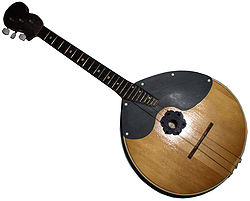 |
|
| Domra Domra The domra is a long-necked Russian string instrument of the lute family with a round body and three or four metal strings.-History:In 1896, a student of Vasily Vasilievich Andreyev found a broken instrument in a stable in rural Russia... |
G D A E | 4 strings/4 courses | Ukraine | Standard "mandolin" fifths tuning |  |
|
| Dotara Dotara The dotara is a two or four or some times five stringed musical instrument resembling more to mandolin than a guitar... |
G2 G3 • C4 • G4 • G4 • C5 | 6 strings/5 courses | Bangladesh | |||
| Double bass Double bass The double bass, also called the string bass, upright bass, standup bass or contrabass, is the largest and lowest-pitched bowed string instrument in the modern symphony orchestra, with strings usually tuned to E1, A1, D2 and G2... |
E1 A1 D2 G2 | 4 strings/4 courses | Bass, bass fiddle, contrabass, string bass, standup bass, doghouse bass | Europe | Orchestral tuning |  |
| Double bass Double bass The double bass, also called the string bass, upright bass, standup bass or contrabass, is the largest and lowest-pitched bowed string instrument in the modern symphony orchestra, with strings usually tuned to E1, A1, D2 and G2... |
F#1 B1 E2 A2 | 4 strings/4 courses | Bass (as above) | Europe | Solo tuning |  |
| Dranyen | A3 A3 • D4 D3 D3 • G3 G3 | 7 strings/3 courses | Dramyin, Dramnyen | Bhutan and Tibet | Bhutanese 7 string tuning | |
| Dranyen | A3 A3 • D3 D3 • G3 G3 | 6 strings/3 courses | Dramyin, Dramnyen | Bhutan and Tibet | Tibetan 6 string tuning | |
| Dulcimer Appalachian dulcimer The Appalachian dulcimer is a fretted string instrument of the zither family, typically with three or four strings. It is native to the Appalachian region of the United States... |
A3 A3 D3 | 3-6 strings/3 courses | Mountain, Appalachian or Lap Dulcimer (Dulcimore, Delcimore, Delcimer) |
USA | Ionian Tuning (The traditional dulcimer is fretted diatonically whole, whole, half, whole, whole, half, whole. ) | |
| Dulcimer Appalachian dulcimer The Appalachian dulcimer is a fretted string instrument of the zither family, typically with three or four strings. It is native to the Appalachian region of the United States... |
D4 A3 D3 | 3-6 strings/3 courses | Mountain, Appalachian or Lap Dulcimer (Dulcimore, Delcimore, Delcimer) |
USA | Mixolydian Tuning | |
| Dulcimer Appalachian dulcimer The Appalachian dulcimer is a fretted string instrument of the zither family, typically with three or four strings. It is native to the Appalachian region of the United States... |
G3 A3 D3 | 3-6 strings/3 courses | Mountain, Appalachian or Lap Dulcimer (Dulcimore, Delcimore, Delcimer) |
USA | Dorian Tuning | |
| Dulcimer Appalachian dulcimer The Appalachian dulcimer is a fretted string instrument of the zither family, typically with three or four strings. It is native to the Appalachian region of the United States... |
C4 A3 D3 | 3-6 strings/3 courses | Mountain, Appalachian or Lap Dulcimer (Dulcimore, Delcimore, Delcimer) |
USA | Aeolian Tuning | |
| Dulcimer Appalachian dulcimer The Appalachian dulcimer is a fretted string instrument of the zither family, typically with three or four strings. It is native to the Appalachian region of the United States... |
D4 D4 D4 | 3-6 strings/3 courses | Mountain, Appalachian or Lap Dulcimer (Dulcimore, Delcimore, Delcimer) |
USA | "Galax" or Unison Tuning | |
| Dulcimer Appalachian dulcimer The Appalachian dulcimer is a fretted string instrument of the zither family, typically with three or four strings. It is native to the Appalachian region of the United States... |
D4 D4 D3 | 3-6 strings/3 courses | Mountain, Appalachian or Lap Dulcimer (Dulcimore, Delcimore, Delcimer) |
USA | "Bagpipe" Tuning |
E
| Instrument | Tuning | Strings & Courses | Alternative Names | Origin | Notes | Picture |
|---|---|---|---|---|---|---|
| Erhu Erhu The erhu is a two-stringed bowed musical instrument, more specifically a spike fiddle, which may also be called a "southern fiddle", and sometimes known in the Western world as the "Chinese violin" or a "Chinese two-stringed fiddle". It is used as a solo instrument as well as in small ensembles... |
D4 A4 | 2 strings/2 courses | Nanhu | China | Standard tuning |  |
F
| Instrument | Tuning | Strings & Courses | Alternative Names | Origin | Notes | Picture |
|---|---|---|---|---|---|---|
| Fiddle Fiddle The term fiddle may refer to any bowed string musical instrument, most often the violin. It is also a colloquial term for the instrument used by players in all genres, including classical music... |
G3 D4 A4 E5 | 4 Strings/4 courses | Violin Violin The violin is a string instrument, usually with four strings tuned in perfect fifths. It is the smallest, highest-pitched member of the violin family of string instruments, which includes the viola and cello.... |
"Standard" or "Italian" tuning | ||
| Fiddle Fiddle The term fiddle may refer to any bowed string musical instrument, most often the violin. It is also a colloquial term for the instrument used by players in all genres, including classical music... |
F3 C4 G4 D5 | 4 Strings/4 courses | Violin Violin The violin is a string instrument, usually with four strings tuned in perfect fifths. It is the smallest, highest-pitched member of the violin family of string instruments, which includes the viola and cello.... |
Cajun tuning to accompany accordion | ||
| Fiddle Fiddle The term fiddle may refer to any bowed string musical instrument, most often the violin. It is also a colloquial term for the instrument used by players in all genres, including classical music... |
G3 D4 G4 B4 | 4 strings/4 courses | Violin Violin The violin is a string instrument, usually with four strings tuned in perfect fifths. It is the smallest, highest-pitched member of the violin family of string instruments, which includes the viola and cello.... |
Open G tuning Scordatura A scordatura , also called cross-tuning, is an alternative tuning used for the open strings of a string instrument, in which the notes indicated in the score would represent the finger position as if played in regular tuning, while the actual pitch is altered... |
||
| Fiddle Fiddle The term fiddle may refer to any bowed string musical instrument, most often the violin. It is also a colloquial term for the instrument used by players in all genres, including classical music... |
G3 D4 G4 D5 | 4 strings/4 courses | Violin Violin The violin is a string instrument, usually with four strings tuned in perfect fifths. It is the smallest, highest-pitched member of the violin family of string instruments, which includes the viola and cello.... |
Sawmill tuning Scordatura A scordatura , also called cross-tuning, is an alternative tuning used for the open strings of a string instrument, in which the notes indicated in the score would represent the finger position as if played in regular tuning, while the actual pitch is altered... |
||
| Fiddle Fiddle The term fiddle may refer to any bowed string musical instrument, most often the violin. It is also a colloquial term for the instrument used by players in all genres, including classical music... |
G3 D4 A4 D5 | 4 strings/4 courses | Violin Violin The violin is a string instrument, usually with four strings tuned in perfect fifths. It is the smallest, highest-pitched member of the violin family of string instruments, which includes the viola and cello.... |
"Gee-dad" Scordatura A scordatura , also called cross-tuning, is an alternative tuning used for the open strings of a string instrument, in which the notes indicated in the score would represent the finger position as if played in regular tuning, while the actual pitch is altered... |
||
| Fiddle Fiddle The term fiddle may refer to any bowed string musical instrument, most often the violin. It is also a colloquial term for the instrument used by players in all genres, including classical music... |
D3 D4 A4 D5 | 4 strings/4 courses | Violin Violin The violin is a string instrument, usually with four strings tuned in perfect fifths. It is the smallest, highest-pitched member of the violin family of string instruments, which includes the viola and cello.... |
Open D tuning Scordatura A scordatura , also called cross-tuning, is an alternative tuning used for the open strings of a string instrument, in which the notes indicated in the score would represent the finger position as if played in regular tuning, while the actual pitch is altered... |
||
| Fiddle Fiddle The term fiddle may refer to any bowed string musical instrument, most often the violin. It is also a colloquial term for the instrument used by players in all genres, including classical music... |
A3 D4 A4 E5 | 4 strings/4 courses | Violin Violin The violin is a string instrument, usually with four strings tuned in perfect fifths. It is the smallest, highest-pitched member of the violin family of string instruments, which includes the viola and cello.... |
Old-timey D tuning Scordatura A scordatura , also called cross-tuning, is an alternative tuning used for the open strings of a string instrument, in which the notes indicated in the score would represent the finger position as if played in regular tuning, while the actual pitch is altered... , or High bass |
||
| Fiddle Fiddle The term fiddle may refer to any bowed string musical instrument, most often the violin. It is also a colloquial term for the instrument used by players in all genres, including classical music... |
A3 E4 A4 E5 | 4 strings/4 courses | Violin Violin The violin is a string instrument, usually with four strings tuned in perfect fifths. It is the smallest, highest-pitched member of the violin family of string instruments, which includes the viola and cello.... |
Cross Tuning, or High bass, high counter Scordatura A scordatura , also called cross-tuning, is an alternative tuning used for the open strings of a string instrument, in which the notes indicated in the score would represent the finger position as if played in regular tuning, while the actual pitch is altered... |
||
| Fiddle Fiddle The term fiddle may refer to any bowed string musical instrument, most often the violin. It is also a colloquial term for the instrument used by players in all genres, including classical music... |
A3 E4 A4 C5 | 4 strings/4 courses | Violin Violin The violin is a string instrument, usually with four strings tuned in perfect fifths. It is the smallest, highest-pitched member of the violin family of string instruments, which includes the viola and cello.... |
Calico, or Black Mountain Rag tuning Scordatura A scordatura , also called cross-tuning, is an alternative tuning used for the open strings of a string instrument, in which the notes indicated in the score would represent the finger position as if played in regular tuning, while the actual pitch is altered... ; Sweden: Trollstämning, or Näckastämning |
G
| Instrument | Tuning | Strings & Courses | Alternative Names | Origin | Notes | Picture |
|---|---|---|---|---|---|---|
| Gabusi | D g bb dd | 6 strings/4 courses | Gaboussi | Comoros Islands | Standard tuning | |
| Gadulka Gadulka The gadulka is a traditional Bulgarian bowed string instrument. Alternate spellings are "gudulka" and "g'dulka". Its name comes from a root meaning "to make noise, hum or buzz"... |
A3 E3 A4 | 3 strings/3 courses | The Balkans Balkans The Balkans is a geopolitical and cultural region of southeastern Europe... |
3 playing strings, with up to 10 sympathetic string Sympathetic string Sympathetic strings or resonance strings are auxiliary strings found on many Indian musical instruments, as well as some Western Baroque instruments and a variety of folk instruments... s. |
 |
|
| Grajappi | FF • BB | 4 strings/2 courses | Thailand | Thai tuning | ||
| Guitar Guitar The guitar is a plucked string instrument, usually played with fingers or a pick. The guitar consists of a body with a rigid neck to which the strings, generally six in number, are attached. Guitars are traditionally constructed of various woods and strung with animal gut or, more recently, with... |
E2 A2 D3 G3 B3 E4 | 6 strings/6 courses | Axe, Guit-box (both colloquial) | Spain | Standard tuning | 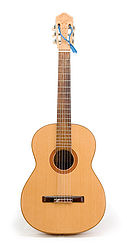 |
| Guitar Guitar The guitar is a plucked string instrument, usually played with fingers or a pick. The guitar consists of a body with a rigid neck to which the strings, generally six in number, are attached. Guitars are traditionally constructed of various woods and strung with animal gut or, more recently, with... |
D2 A2 D3 G3 B3 E4 | 6 strings/6 courses | " | Drop D tuning |  |
|
| Guitar Guitar The guitar is a plucked string instrument, usually played with fingers or a pick. The guitar consists of a body with a rigid neck to which the strings, generally six in number, are attached. Guitars are traditionally constructed of various woods and strung with animal gut or, more recently, with... |
E2 A2 E3 A3 C#4 E4 | 6 strings/6 courses | " | Open A major tuning. Just one of many open tunings. See 'see also' section for more. |  |
|
| Guitar Guitar The guitar is a plucked string instrument, usually played with fingers or a pick. The guitar consists of a body with a rigid neck to which the strings, generally six in number, are attached. Guitars are traditionally constructed of various woods and strung with animal gut or, more recently, with... , 7 string |
B1 E2 A2 D3 G3 B3 E4 | 7 strings/7 courses | Standard tuning | |||
| Guitar Guitar The guitar is a plucked string instrument, usually played with fingers or a pick. The guitar consists of a body with a rigid neck to which the strings, generally six in number, are attached. Guitars are traditionally constructed of various woods and strung with animal gut or, more recently, with... , 7 string |
A1 E2 A2 D3 G3 B3 E4 | 7 strings/7 courses | Van Eps Tuning | |||
| Guitar Guitar The guitar is a plucked string instrument, usually played with fingers or a pick. The guitar consists of a body with a rigid neck to which the strings, generally six in number, are attached. Guitars are traditionally constructed of various woods and strung with animal gut or, more recently, with... , 8 string (low/high) |
B1 E2 A2 D3 G3 B3 E4 A4 | 8 strings/8 courses | 8 string classical guitar | Galbraith tuning | ||
| Guitar Guitar The guitar is a plucked string instrument, usually played with fingers or a pick. The guitar consists of a body with a rigid neck to which the strings, generally six in number, are attached. Guitars are traditionally constructed of various woods and strung with animal gut or, more recently, with... , 8 string (added basses) |
[B1 D2] E2 A2 D3 G3 B3 E4 | 8 strings/8 courses | 8 string classical guitar | Tuning of two lowest strings varies with player and music | ||
| Guitar Guitar The guitar is a plucked string instrument, usually played with fingers or a pick. The guitar consists of a body with a rigid neck to which the strings, generally six in number, are attached. Guitars are traditionally constructed of various woods and strung with animal gut or, more recently, with... , 9 string |
E3 E2•A3 A2• D4 D3• G3 B3 E4 | 9 strings/6 courses | 12-string guitar variant | |||
| Guitar Guitar The guitar is a plucked string instrument, usually played with fingers or a pick. The guitar consists of a body with a rigid neck to which the strings, generally six in number, are attached. Guitars are traditionally constructed of various woods and strung with animal gut or, more recently, with... , 9 string |
E2• A2• D3• G4 G3 • B3 B3 • E4 E4 | 9 strings/6 courses | 12-string guitar variant | |||
| Guitar Guitar The guitar is a plucked string instrument, usually played with fingers or a pick. The guitar consists of a body with a rigid neck to which the strings, generally six in number, are attached. Guitars are traditionally constructed of various woods and strung with animal gut or, more recently, with... , 10 string |
F#1 G#1 A#1 C2 E3 A2 D3 G3 B3 E4 | 10 strings/10 courses | 10 String classical guitar | Standard tuning | ||
| Guitar Guitar The guitar is a plucked string instrument, usually played with fingers or a pick. The guitar consists of a body with a rigid neck to which the strings, generally six in number, are attached. Guitars are traditionally constructed of various woods and strung with animal gut or, more recently, with... , 12 string |
E3 E2 • A3 A2 • D4 D3 • G4 G3 • B3 B3 • E4 E4 |
12 strings /6 courses | Twelve-stringed Guitar | Standard tuning. Some players tune the second course G string to unison to minimize breakage. | ||
| Guitar Guitar The guitar is a plucked string instrument, usually played with fingers or a pick. The guitar consists of a body with a rigid neck to which the strings, generally six in number, are attached. Guitars are traditionally constructed of various woods and strung with animal gut or, more recently, with... , 12 string |
E4 E2 • A3 A2 • D4 D3 • G4 G3 • B3 B3 • E4 E4 |
12 strings /6 courses | Twelve-stringed Guitar | Variant tuning (double octave on low 'E'). | ||
| Guitar, baritone Baritone guitar The baritone guitar is a variation on the standard guitar, with a longer scale length that allows it to be tuned to a lower range. It first appeared in the classical music realm... |
B1 E2 A2 D3 F3 B3 | 6 strings/6 courses | Standard 4th lower tuning | |||
| Guitar, baritone Baritone guitar The baritone guitar is a variation on the standard guitar, with a longer scale length that allows it to be tuned to a lower range. It first appeared in the classical music realm... |
A1 D2 G2 C3 E3 A3 | 6 strings/6 courses | Standard 5th lower tuning | |||
| Guitar, baritone Baritone guitar The baritone guitar is a variation on the standard guitar, with a longer scale length that allows it to be tuned to a lower range. It first appeared in the classical music realm... |
E1 A1 D2 G2 B2 E3 | 6 strings/6 courses | Octave lower tuning | |||
| Guitar, bass Bass guitar The bass guitar is a stringed instrument played primarily with the fingers or thumb , or by using a pick.... |
E1 A1 D2 G2 | 4 strings/4 courses | Bass, electric bass | Standard 4-string tuning |  |
|
| Guitar, bass Bass guitar The bass guitar is a stringed instrument played primarily with the fingers or thumb , or by using a pick.... (5-string) |
B0 E1 A1 D2 G2 | 5 strings/5 courses | Bass, electric bass | E1 A1 D2 G2 C3 is also used |  |
|
| Guitar, bass Bass guitar The bass guitar is a stringed instrument played primarily with the fingers or thumb , or by using a pick.... (6-string) |
B0 E1 A1 D2 G2 C3 | 6 strings/6 courses | Bass, electric bass, Contrabass Guitar |  |
||
| Guitar, octave | E3 • A3 • D4 • G4 • B4 • E5 | 6 strings/6 courses | Germany | One octave higher than standard guitar. | ||
| Guitar, tenor Tenor guitar 1932 Martin 0-18 T Sunburst Tenor Guitar|thumb|rightThe tenor guitar or four-string guitar is a slightly smaller, four-string relative of the steel-string acoustic guitar or electric guitar. The instrument was developed so that players of the four-string tenor banjo could double on the guitar... |
C3 • G3 • D4 • A4 | 4 strings/4 courses | USA | Standard tuning. | 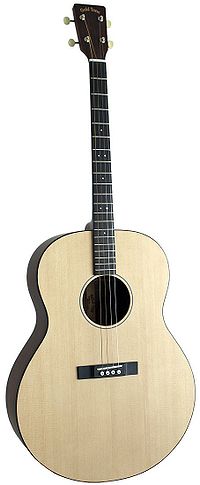 |
|
| Guitarrico | B4 F#4 D5 A5 E5 | 6 strings/6 courses | Guitarro | Spain | Standard tuning | |
| Guitarrón Guitarrón See also: Guitarrón ChilenoThe guitarrón mexicano or Mexican guitarron, is a very large, deep-bodied Mexican 6-string acoustic bass played in mariachi groups... |
A1 D2 G2 C3 E3 A2 | 6 strings/6 courses | Guitarrón de Toloche | Mexico | Standard tuning | |
| Guitarrón chileno Guitarrón chileno See also: Guitarrón mexicanoThe guitarrón chileno or Chilean guitarron is a plucked string instrument with 25 strings from Chile. Its origin dates back to the 16th century. It is used to accompany el Canto del Poeta , an old chilena folk genre that cultivates décima and improvisation, known as payada... |
D4 D4 D3 D3 D2 • G4 G4 G4 G3 G3 • (C4) C4 C4 C3 C2 • E4 E4 E4 • A4 A4 A4 res. strings: F#5 A4 G4 B4 |
24 or 25 strings/5 courses + 4 resonating strings | Chile | Standard tuning | ||
| Guqin Guqin The guqin is the modern name for a plucked seven-string Chinese musical instrument of the zither family... |
C D F G A c d | 7 strings/7 courses | China | Standard 'Zheng Diao' tuning |  |
H
| Instrument | Tuning | Strings & Courses | Alternative Names | Origin | Notes | Picture |
|---|---|---|---|---|---|---|
| Halszither | G2 G2 • D3 D3 • G3 G3 • B3 B3 • D4 D4 | 10 strings/5 courses | Krienser Halszither | Switzwerland | ||
| Hardingfele Hardingfele A Hardanger fiddle is a traditional stringed instrument used originally to play the music of Norway. In modern designs, the instruments are very similar to the violin, though with eight or nine strings and thinner wood... |
A D A E | 4 strings/4 courses | Hardanger violin, Hardanger fiddle | Norway | Also has 8 or 9 sympathetic strings | .jpg) |
| Harp Harp The harp is a multi-stringed instrument which has the plane of its strings positioned perpendicularly to the soundboard. Organologically, it is in the general category of chordophones and has its own sub category . All harps have a neck, resonator and strings... , Concert |
Cb1 Db1 Eb1 Fb1 Gb1 Ab1 Bb1 [ . . . ] * Cb7 Db7 Eb7 Fb7 Gb7 |
47 strings / 47 courses | Pedal Harp, Double-action Harp, Diatonic Double-action Harp | France | * Tuning proceeds through 6-1/2 octaves using the Cb diatonic scale | |
| Harzither | GG • CC • EE • GG | 8 strings/4 courses | Bergzither | Germany | ||
| Huapanguera Huapanguera The guitarra quinta huapanguera or guitarra huapanguera is a Mexican guitar-like instrument that usually forms part of a conjunto huasteco ensemble, along with the jarana huasteca guitar and violin. Here it takes on the role of the bass instrument using a rhythmical strumming technique. Its... |
G2 • D3 D4 • G3 G3 • B3 B3 • E3 | 8 strings/5 courses | Mexico | |||
| Hurdy Gurdy Hurdy gurdy The hurdy gurdy or hurdy-gurdy is a stringed musical instrument that produces sound by a crank-turned rosined wheel rubbing against the strings. The wheel functions much like a violin bow, and single notes played on the instrument sound similar to a violin... |
A A • G • C | 6 strings/4 courses | France | Some are drone strings. | 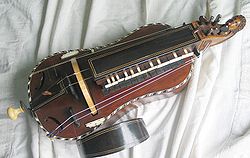 |
I
| Instrument | Tuning | Strings & Courses | Alternative Names | Origin | Notes | Picture |
|---|
J
| Instrument | Tuning | Strings & Courses | Alternative Names | Origin | Notes | Picture |
|---|---|---|---|---|---|---|
| Jarana huasteca | G3 • B3 • D4 • F#4 • A4 | 5 strings/5 courses | Mexico | Standard tuning | ||
| Jarana jarocha | A3 • D4 D4 • G3 G4 • B3 B3 • E4 | 8 strings/5 courses | Mexico | Standard tuning | 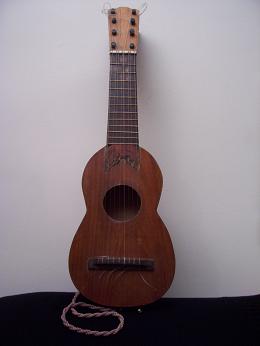 |
|
| Jouhikko Jouhikko thumb|right| Replica of a 19th century Jouhikko made by Simon ChadwickThe jouhikko is a traditional, 2 or 3 stringed bowed lyre, from Finland and Karelia. Its strings are traditionally of horsehair. The playing of this instrument died out in the early 20th century but has been revived and there... |
D A E | 3 strings/3 courses | Jouhikannel | Finland | Standard tuning |
K
| Instrument | Tuning | Strings & Courses | Alternative Names | Origin | Notes | Picture |
|---|---|---|---|---|---|---|
| Kacapi Kacapi Kacapi is a zither-like Sundanese musical instrument played as the main accompanying instrument in the Tembang Sunda or Mamaos Cianjuran, kacapi suling genre , pantun stories recitation or an additional instrument in Gamelan Degung performance.Word kacapi in Sundanese also refers to santol tree,... |
A# B C# F F# | 6 strings/3 courses | Malaysia | Uses the pelog scale. Tuning is approximated to western notation. | ||
| Kabosy Kabosy The kabosy is a box-shaped wooden guitar commonly played in music of Madagascar. It has four to six strings and is commonly thought to be a direct descendant of the Arabic oud. The kabosy has staggered frets, many of which do not even cross the entire fretboard, and is generally tuned to an open... |
G • G • B B • D D | 6 strings/4 courses | Madagascar | Open G major tuning | ||
| Kithara Sarda | B2 E2 A2 D3 F3 B3 | 6 strings/6 courses | Sardinia, Italy. | Standard tuning | ||
| Kobsa | GG • DD • GG • CC | 8 strings/4 courses | Kobuz | Moldavia, Romania, Hungary | Standard tuning | |
| Kobsa | DD • AA • DD • GG | 8 strings/4 courses | Kobuz | Moldavia, Romania, Hungary | Alternative tuning | |
| Komuz Komuz The komuz or qomuz , Azeri Gopuz, Turkish Kopuz, is an ancient fretless string instrument used in Central Asian music, related to certain other Turkic string instruments and the lute.... |
A E A | 3 strings/3 courses | Qomuz, Gopuz, Kopuz, Kopus | Kyrgyzstan | Standard tuning | |
| Kwitra | GG • EE • AA • DD | 8 strings/4 courses | Kuitra, Kouitra, Quwaytara | Algeria | Standard tuning |
L
| Instrument | Tuning | Strings & Courses | Alternative Names | Origin | Notes | Picture |
|---|---|---|---|---|---|---|
| Laúd Laúd The word laúd is the Spanish word for lute. It is most commonly used to refer to a plectrum-plucked chordophone from Spain. It belongs to the cittern family of instruments. It has six double courses , similarly to the bandurria, but its neck is longer... |
G C F B E A | 12 strings/6 courses | Spanish laud | Spain | Spanish tuning | 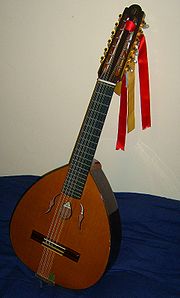 |
| Laúd Laúd The word laúd is the Spanish word for lute. It is most commonly used to refer to a plectrum-plucked chordophone from Spain. It belongs to the cittern family of instruments. It has six double courses , similarly to the bandurria, but its neck is longer... |
D, A, E, B, F#, C# (or D). | 12 strings/6 courses | Spanish laud | Spain | Cuban tuning |  |
| Li'liu | G3 • C3 C4 • E4 • A4 A4 | 6 strings/4 courses | Lili'u, Taropatch, Tenor Ukulele | Hawaii | Standard C6 tuning. Tenor Ukulele with courses 1 and 3 doubled. | |
| Li'liu | G3 G4 • C3 C4 • E4 E4 • A4 A4 | 8 strings/4 courses | Lili'u, Taropatch, Tenor Ukulele | Hawaii | Standard C6 tuning. Double-strung tenor ukulele. | |
| Liuqin Liuqin The liuqin is a four-stringed Chinese mandolin with a pear-shaped body. It is small in size, almost a miniature copy of another Chinese plucked musical instrument, the pipa. The range of its voice is much higher than the pipa, and it has its own special place in Chinese music, whether in... |
G3 • D4 • G4 • D5 | 4 strings/4 courses | liuyeqin, willow leaf instrument | China | Standard tuning | |
| Lute Lute Lute can refer generally to any plucked string instrument with a neck and a deep round back, or more specifically to an instrument from the family of European lutes.... |
G2 G2 • C3 C3 • F3 F3 • A3 A3 • D4 D4 • G4 G4 | 12 strings/6 courses | Europe | Medieval tuning 6-course tuning | 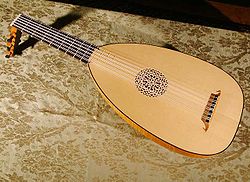 |
|
| Lute Lute Lute can refer generally to any plucked string instrument with a neck and a deep round back, or more specifically to an instrument from the family of European lutes.... |
C'C D'D E♭'E♭ F'F G'G Cc FF AA dd g | 19 strings/10 courses | Europe | Renaissance 10-course tuning |  |
|
| Lute Lute Lute can refer generally to any plucked string instrument with a neck and a deep round back, or more specifically to an instrument from the family of European lutes.... |
D'D F'F G'G Cc FF AA dd g | 15 strings/8 courses | Europe | Renaissance 8-course tuning |  |
|
| Lute Lute Lute can refer generally to any plucked string instrument with a neck and a deep round back, or more specifically to an instrument from the family of European lutes.... |
A"A' B"B' C'C D'D E'E F'F G'G A'A' DD FF AA d f | 24 strings/13 courses | Europe | Baroque D minor tuning for 13 courses |  |
|
| Lyra Lyra Lyra is a small constellation. It is one of the 48 constellations listed by the 2nd century astronomer Ptolemy, and remains one of the 88 modern constellations recognized by the International Astronomical Union. Its principal star, Vega — a corner of the Summer Triangle — is one of the brightest... |
D3 A3 E5 | 3 strings/3 courses | Crete, Greece | Modern tuning | 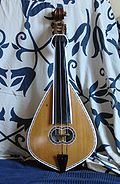 |
M
| Instrument | Tuning | Strings & Courses | Alternative Names | Origin | Notes | Picture |
|---|---|---|---|---|---|---|
| Mandobass Mandobass Mandobass is a common term for the largest members of the mandolin family, sometimes used as bass instruments in mandolin orchestras.-Variants:There are three main variants of the mandobass:... |
E1 A1 D2 G2 | 4 strings/4 courses | Standard tuning | |||
| Mandola Mandola The mandola or tenor mandola is a fretted, stringed musical instrument. It is to the mandolin what the viola is to the violin: the four double courses of strings tuned in fifths to the same pitches as the viola , a fifth lower than a mandolin... |
C3 C3 • G3 G3 • D4 D4 • A4 A4 | 8 strings/4 courses | Tenor mandola | Standard tuning. Pitched a 5th below mandolin tuning. Known in Europe as the tenor mandola. |
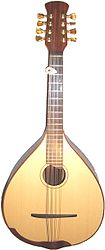 |
|
| Mandocello Mandocello The mandocello is a plucked string instrument of the mandolin family. It has eight strings in four paired courses, tuned in 5ths like a mandolin, but is larger, and tuned CC-GG-dd-aa . It is to the mandolin what the cello is to the violin.-Construction:Mandocello construction is similar to the... |
C2 C2 • G2 G2 • D3 D3 • A3 A3 | 8 strings/4 courses | mandolincello or mandoloncello | Standard tuning. Pitched an octave below the mandola. | ||
| Mandolin Mandolin A mandolin is a musical instrument in the lute family . It descends from the mandore, a soprano member of the lute family. The mandolin soundboard comes in many shapes—but generally round or teardrop-shaped, sometimes with scrolls or other projections. A mandolin may have f-holes, or a single... |
G3 G3 • D4 D4 • A4 A4 • E5 E5 | 8 strings/4 courses | Mando (colloquial) | Standard tuning | 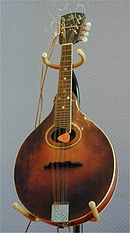 |
|
| Mandolin Mandolin A mandolin is a musical instrument in the lute family . It descends from the mandore, a soprano member of the lute family. The mandolin soundboard comes in many shapes—but generally round or teardrop-shaped, sometimes with scrolls or other projections. A mandolin may have f-holes, or a single... (piccolo) |
C4 C4 • G4 G4 • D5 D5 • A5 A5 | 8 strings/4 courses | Brilliant tone mandolin | Standard tuning | 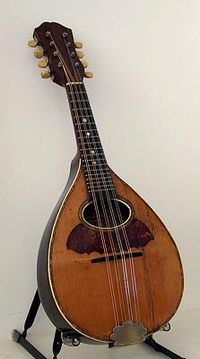 |
|
| Mandolin (Octave) | G2 G2 • D3 D3 • A3 A3 • E4 E4 | 8 strings/4 courses | Tenor Mandolin, Irish Bouzouki, Octave mandola | Standard tuning. Known in Europe as the octave mandola. Pitched an octave below the mandolin. |
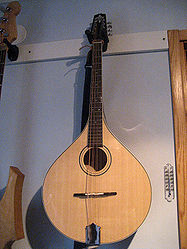 |
|
| Mejorana | D4 A4 A3 B3 E4 | 5 strings/5 courses | Mejoranera | Panama | "Por veinticinco" tuning | |
| Mejorana | D4 G4 G3 B3 E3 | 5 strings/5 courses | Panama | "Por seis" tuning |
N
| Instrument | Tuning | Strings & Courses | Alternative Names | Origin | Notes | Picture |
|---|---|---|---|---|---|---|
| Nyckelharpa | C G C A | 4 strings/4 courses | Sweden | 4 melody strings and several sympathetic strings. | ||
O
| Instrument | Tuning | Strings & Courses | Alternative Names | Origin | Notes | Picture |
|---|---|---|---|---|---|---|
| Octobass Octobass The octobass is an extremely large bowed string instrument constructed about 1850 in Paris by the French luthier Jean Baptiste Vuillaume... |
C0 G0 C1 | 3 strings/3 courses | Subcontrabass, triple bass | France | Orchestral tuning | 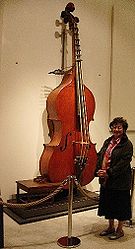 |
| Oud Oud The oud is a pear-shaped stringed instrument commonly used in North African and Middle Eastern music. The modern oud and the European lute both descend from a common ancestor via diverging paths... |
D G A D G C | 11 strings/6 courses | Ud, Al-Ud, Oud Arbi | Middle East | Traditional Arabic tuning | |
| Oud Oud The oud is a pear-shaped stringed instrument commonly used in North African and Middle Eastern music. The modern oud and the European lute both descend from a common ancestor via diverging paths... |
C#/D F# B E A D | 11 strings/6 courses | Ud, Al-Ud, Oud Arbi | Middle East | New Turkish classical tuning. Lowest (single) string pitch varies. Notated a fourth higher. |
P
| Instrument | Tuning | Strings & Courses | Alternative Names | Origin | Notes | Picture |
|---|---|---|---|---|---|---|
| Palida | D3 • A3 • E4 • B4 | 4 strings/4 courses | Europe | Standard tuning | ||
| Pedal Steel Guitar Pedal steel guitar The pedal steel guitar is a type of electric guitar that uses a metal bar to "fret" or shorten the length of the strings, rather than fingers on strings as with a conventional guitar. Unlike other types of steel guitar, it also uses pedals and knee levers to affect the pitch, hence the name "pedal"... |
B2 D3 E3 F#3 G#3 B3 E4 G#4 D#4 F#4 | 10 strings/10 courses | United States | E9 Standard tuning, single neck (S-10) or front neck of a double neck (D-10) instrument | 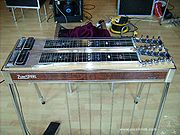 |
|
| Pedal Steel Guitar Pedal steel guitar The pedal steel guitar is a type of electric guitar that uses a metal bar to "fret" or shorten the length of the strings, rather than fingers on strings as with a conventional guitar. Unlike other types of steel guitar, it also uses pedals and knee levers to affect the pitch, hence the name "pedal"... |
C2 F2 A2 C3 E3 G3 A3 C4 E4 D4 | 10 strings/10 courses | United States | C6 Standard tuning, rear neck of a double neck (D-10) instrument. Some players use G4 instead of D4. |  |
|
| Phin | A3 E4 A4 | 3 strings/3 courses | Thailand | Standard tuning | ||
| Pipa | A2 D3 E3 A3 | 4 strings/4 courses | China | Standard tuning | 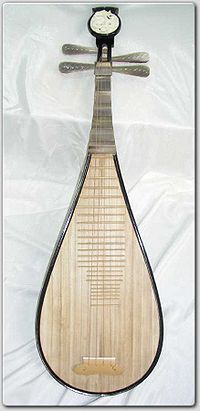 |
|
| Portuguese guitar Portuguese guitar The Portuguese guitar or Portuguese guitarra is a plucked string instrument with twelve steel strings, strung in six courses comprising two strings each. It is one of the few musical instruments to use Preston tuners. It is most notably associated with fado.-History:The origin of the Portuguese... / guitarra portuguesa |
D3 D2 • A3 A2 • B3 B2 • E3 E3 • A3 A3 • B3 B3 | 12 strings/6 courses | Portugal | Lisbon / Lisboa tuning | ||
| Portuguese guitar Portuguese guitar The Portuguese guitar or Portuguese guitarra is a plucked string instrument with twelve steel strings, strung in six courses comprising two strings each. It is one of the few musical instruments to use Preston tuners. It is most notably associated with fado.-History:The origin of the Portuguese... / guitarra portuguesa |
C3 C2 • G3 G2 • A3 A2 • D3 D3 • G3 G3 • A3 A3 | 12 strings/6 courses | Portugal | Coimbra tuning |
Q
| Instrument | Tuning | Strings & Courses | Alternative Names | Origin | Notes | Picture |
|---|---|---|---|---|---|---|
| Qinqin Qinqin The qinqin is a plucked Chinese lute. It was originally manufactured with a wooden body, a slender fretted neck, and three strings. Its body can be either round, hexagonal , or octagonal. Often, only two strings were used, as in certain regional silk-and-bamboo ensembles... |
G3 D4 A5 | 3 strings/3 courses | China |
R
| Instrument | Tuning | Strings & Courses | Alternative Names | Origin | Notes | Picture |
|---|---|---|---|---|---|---|
| Rajao | D G C E AA | 6 strings/5 courses | Rajão | Portugal | ||
| Ramkie Ramkie The Ramkie is a type of guitar usually made in South Africa, Botswana, Zambia, Namibia and Malawi. It is made using a discarded oil can for the soundbox. The strings are made of fishing wire or bicycle brake wire... |
C F A C | 4 strings/4 courses | Afri-can, Kitaar | South Africa | Common 4-string open tuning | |
| Rebab Rebab The rebab , also rebap, rabab, rebeb, rababah, or al-rababa) is a type of string instrument so named no later than the 8th century and spread via Islamic trading routes over much of North Africa, the Middle East, parts of Europe, and the Far East... |
D3 A3 | 2 strings/2 courses | Java | Tuning given is approximate: does not follow western equal temperament | ||
| Requinto Requinto The term requinto is used in both Spanish and Portuguese to mean a smaller, higher-pitched version of another instrument. Thus, there are requinto guitars, drums, and several wind instruments.-Wind instruments:... |
A2 D3 G3 C4 E4 A4 | 6 strings/6 courses | Latin America | Standard tuning | ||
| Ronroco | G3 G3 • C3 C3 • E4 E3 • A3 A3 • E4 E4 | 10 strings/5 courses | Ronrroco | Andean Region Andean region Andean region may refer to:* Andes, mountain chain in South America* Andean Region * Andean Region of Colombia... |
Standard C6 tuning (tuned an octave below the charango). | |
| Ruan Ruan The ruan is a Chinese plucked string instrument. It is a lute with a fretted neck, a circular body, and four strings. Its strings were formerly made of silk but since the 20th century they have been made of steel... |
G2 D3 G3 D4 | 4 strings/4 courses | Ruanqin | China | Standard tuning | |
| Russian guitar Russian guitar The Russian guitar is a seven-string acoustic guitar that arrived in Russia toward the end of the 18th century and the beginning of the 19th century, most probably as an evolution of the cittern, kobza, and torban... |
D G B D G B D | 7 strings/7 courses | semistrunnaya gitara, semistrunka | Russia | Standard tuning |
S
| Instrument | Tuning | Strings & Courses | Alternative Names | Origin | Notes | Picture |
|---|---|---|---|---|---|---|
| Sanshin Sanshin The sanshin is an Okinawan musical instrument and precursor of the Japanese shamisen. Often likened to a banjo, it consists of a snakeskin-covered body, neck and three strings.... |
C • F • C | 3 strings/3 courses | Okinawa shamisen, jabisen | Ryukyu Islands Ryukyu Islands The , also known as the , is a chain of islands in the western Pacific, on the eastern limit of the East China Sea and to the southwest of the island of Kyushu in Japan. From about 1829 until the mid 20th century, they were alternately called Luchu, Loochoo, or Lewchew, akin to the Mandarin... , Japan |
Standard tuning |  |
| Sargija Šargija The šargija is a plucked, fretted long necked chordophone used in the folk music of various Balkan countries, including Bosnia and Herzegovina, Croatia, Albania and Serbia.... |
C3 C3 • G3 G3 • D3 D3 | 3 strings/3 courses | Sharkia, Sharki, Shargija | Albania | Standard tuning | |
| Setar Setar SETAR N.V., is the privatised full telecommunications service provider for the island of Aruba. The services provided by SETAR include: telephone, internet and GSM-related wireless services. SETAR also owns Tele Aruba.... |
C3 C4 • G3 • C4 | 4 strings/3 courses | Iran | Standard tuning |  |
|
| Shamisen Shamisen The , also called is a three-stringed, Japanese musical instrument played with a plectrum called a bachi. The Japanese pronunciation is usually "shamisen" but sometimes "jamisen" when used as a suffix . -Construction:The shamisen is a plucked stringed instrument... |
D G D | 3 strings/3 courses | Samisen, Sangen | Japan | Standard "Honchoshi" tuning | |
| Shamisen Shamisen The , also called is a three-stringed, Japanese musical instrument played with a plectrum called a bachi. The Japanese pronunciation is usually "shamisen" but sometimes "jamisen" when used as a suffix . -Construction:The shamisen is a plucked stringed instrument... |
D G C | 3 strings/3 courses | Samisen, Sangen | Japan | "San sagari" tuning | |
| Shamisen Shamisen The , also called is a three-stringed, Japanese musical instrument played with a plectrum called a bachi. The Japanese pronunciation is usually "shamisen" but sometimes "jamisen" when used as a suffix . -Construction:The shamisen is a plucked stringed instrument... |
D A D | 3 strings/3 courses | Samisen, Sangen | Japan | "Ni agari" tuning | |
| Sitar Sitar The 'Tablaman' is a plucked stringed instrument predominantly used in Hindustani classical music, where it has been ubiquitous since the Middle Ages... |
C5 C4 G3 C2 G2/C2 C2 F2 | 3 drone strings, 5 melody strings, usually 12 sympathetic strings. | North India | 5th string can be tuned in C. Sympathetic strings are tuned depending on the raga Raga A raga is one of the melodic modes used in Indian classical music.It is a series of five or more musical notes upon which a melody is made... being played. |
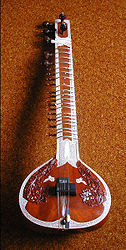 |
|
| Socavon | E D A B | 4 strings/4 courses | Bocona | Panama | Standard tuning | |
| Strumstick | G D G | 3 strings/3 courses | Dulcitar, Dulcimer stick, Strumbly | USA | Standard tuning |
T
| Instrument | Tuning | Strings & Courses | Alternative Names | Origin | Notes | Picture |
|---|---|---|---|---|---|---|
| Tahitian ukulele Tahitian ukulele The Tahitian ukulele is a short-necked fretted lute with eight nylon strings in four doubled courses, native to Tahiti and played in other regions of Polynesia... |
G4 G4 • C5 C5 • E5 E5 • A4 A4. | 8 strings/4 courses | Tahitian banjo, Ukulélé Tahitien, Youke (coloquial). | Tahiti | Standard tuning | |
| Tambura Tambura The tambura, tanpura, or tambora is a long-necked plucked lute . The body shape of the tambura somewhat resembles that of the sitar, but it has no frets – only the open strings are played to accompany other musicians... |
DD • GG • BB • EE | 8 strings/4 courses | Tamboura | Bulgaria | Standard tuning | |
| Tambura Tambura The tambura, tanpura, or tambora is a long-necked plucked lute . The body shape of the tambura somewhat resembles that of the sitar, but it has no frets – only the open strings are played to accompany other musicians... |
DD • AA | 4 strings/2 courses | Tamboura | Macedonia | Standard tuning | |
| Tar Tar (lute) The tār is a long-necked, waisted Iranian instrument. It has been adopted by other cultures and Azerbaijan. The word tar itself means "string" in Persian, though it might have the same meaning in languages influenced by Persian or any other branches of Iranian languages like Kurdish... |
C3 C4 • G3 • C4C4 | 4 strings/3 courses | Iran | Standard tuning |  |
|
| Tarica | C2 • G2 G2 • C3 C3 | 5 strings/3 courses | Tarika, Tricord, Trichord | Europe | Standard tuning | |
| Tarica | D2 • A2 A2 • D3 D3 | 5 strings/3 courses | Tarika, Tricord, Trichord | Europe | Ionian tuning | |
| Taro patch | G3 G4 • C4 C5 • E4 E4 • A4 A4 | 8 strings/4 courses | Taropatch, Tenor Ukulele, Li'liu | Hawaii | Standard C6 tuning. The taro patch is a double-string ukulele. | |
| Terzin Kitarra | G#2 B2 E3 A3 C#4 E4 | 6 strings/6 courses | Malta | Standard 'sol' tuning. | ||
| Timple Timple The timple is a traditional Spanish plucked string instrument of the Canary Islands.In La Palma island and in the north of the island of Tenerife, many timple players omit the fifth string, in order to play the timple as a four-string ukulele, though this is considered less traditional by players... |
G4 C5 E4 A4 D5 | 5 strings/5 courses | Canary Island Tiple | Canary Islands, Spain. | Standard tuning. |  |
| Tiple Tiple Tiple is the Spanish word for treble or soprano, is often applied to specific instruments, generally to refer to a small chordophone of the guitar family. A tiple player is called a tiplista.-Colombian tiple:... , American |
A4 A3 • D4 D3 D4 • F#4 F#3 F#4 • B3 B3 | 10 strings/4 courses | Tiple ukulele, Martin Tiple | USA | Standard D6 tuning. The D and F# are triple-strung; the other strings are paired. | |
| Tiple Tiple Tiple is the Spanish word for treble or soprano, is often applied to specific instruments, generally to refer to a small chordophone of the guitar family. A tiple player is called a tiplista.-Colombian tiple:... , Colombian |
C4 C3 C4 • E4 E3 E4 • A4 A3 A4 • D4 D4 D4 | 12 strings/4 courses | Tiple Colombiano | Colombia | Traditional tuning. | 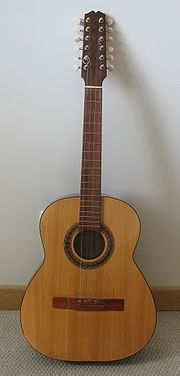 |
| Tiple Tiple Tiple is the Spanish word for treble or soprano, is often applied to specific instruments, generally to refer to a small chordophone of the guitar family. A tiple player is called a tiplista.-Colombian tiple:... , Colombian |
D4 D3 D4 • G4 G3 G4 • B4 B3 B4 • E4 E4 E4 | 12 strings/4 courses | Tiple Colombiano | Colombia | Modern G6 tuning. |  |
| Tiple Tiple Tiple is the Spanish word for treble or soprano, is often applied to specific instruments, generally to refer to a small chordophone of the guitar family. A tiple player is called a tiplista.-Colombian tiple:... , Puerto Rican |
E3 • A3 • D4 • G4 C5 | 5 strings/5 courses | Tiple Doliente | Puerto Rico | Standard tuning |  |
| Trembulo Trembulo The trembulo is an instrument similar to a tiple, but smaller. It is thought to have been first developed by Portuguese luthiers around 1600. It seems likely to have developed from the 4-course renaissance guitar.... |
DD • AA • EE • BB | 8 strings/4 courses | Europe | 8 string tuning tuning | ||
| Trembulo Trembulo The trembulo is an instrument similar to a tiple, but smaller. It is thought to have been first developed by Portuguese luthiers around 1600. It seems likely to have developed from the 4-course renaissance guitar.... |
D • AA • EE • BB | 7 strings/4 courses | Europe | 7 string tuning tuning | ||
| Trembulo Trembulo The trembulo is an instrument similar to a tiple, but smaller. It is thought to have been first developed by Portuguese luthiers around 1600. It seems likely to have developed from the 4-course renaissance guitar.... |
D • A • EE • BB | 6 strings/4 courses | Europe | 6 string tuning tuning | ||
| Trembulo Fusão Trembulo The trembulo is an instrument similar to a tiple, but smaller. It is thought to have been first developed by Portuguese luthiers around 1600. It seems likely to have developed from the 4-course renaissance guitar.... |
D • A • EE • BB | 6 strings/4 courses | South America | Common tuning | ||
| Tres Tres The tres is a 3-course, 6-string chordophone which was created in Cuba. A tres player is called a tresero in Cuba and a tresista in Puerto Rico.-Cuban tres:In Cuba, the son was created as a song and a salon dance genre... |
G4 G3 • C4 C4 • E4 E3 | 6 strings/3 courses | Tres Cubano, Cuban Tres | Cuba | Traditional C major tuning | |
| Tres Tres The tres is a 3-course, 6-string chordophone which was created in Cuba. A tres player is called a tresero in Cuba and a tresista in Puerto Rico.-Cuban tres:In Cuba, the son was created as a song and a salon dance genre... |
A4 A3 • D4 D4 • F4 F3 | 6 strings/3 courses | Tres Cubano, Cuban Tres | Cuba | New D major tuning | | | |
| Tzouras Tzouras The Tzouras , is a stringed musical instrument from Greece. It is related to the Bouzouki.It has 6 strings in 3 courses and is tuned D3 D4, A3 A3, D4 D4 or D4 D3, A3 A3, D4 D4. The strings are made of steel.-See also:*Greek musical instruments... |
D3 D4 • A3 A3 • D4 D4 | 6 strings/3 courses | Tzouras | Greece | Standard tuning |
U
| Instrument | Tuning | Strings & Courses | Alternative Names | Origin | Notes | Picture |
|---|---|---|---|---|---|---|
| Ukulele, Concert | G4 C4 E4 A4 | 4 strings/4 courses | Uke (colloquial) | Hawaii | Standard C6 tuning for concert; also used on soprano. | 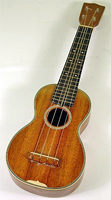 |
| Ukulele, Soprano | A4 D4 F4 B4 | 4 strings/4 courses | Uke (colloquial) | Hawaii | The standard, basic ukulele. This standard D6 tuning is sometimes also used on the Concert Ukulele. |  |
| Ukulele Ukulele The ukulele, ; from ; it is a subset of the guitar family of instruments, generally with four nylon or gut strings or four courses of strings.... (Tenor) |
G3 C4 E4 A4 | 4 strings/4 courses | Uke, Tenor Uke | Hawaii | Standard tenor uke C6 tuning. | |
| Ukulele Ukulele The ukulele, ; from ; it is a subset of the guitar family of instruments, generally with four nylon or gut strings or four courses of strings.... (Baritone) |
D3 G3 B3 E4 | 4 strings/4 courses | Baritone uke (colloquial) | Hawaii | Standard baritone uke G6 tuning | |
V
| Instrument | Tuning | Strings & Courses | Alternative Names | Origin | Notes | Picture |
|---|---|---|---|---|---|---|
| Vihuela Vihuela Vihuela is a name given to two different guitar-like string instruments: one from 15th and 16th century Spain, usually with 12 paired strings, and the other, the Mexican vihuela, from 19th century Mexico with five strings and typically played in Mariachi bands.-History:The vihuela, as it was known... |
A3 • D4 • G4 • B3 • E4 | 5 strings/5 courses | Mexico | Standard tuning | ||
| Viol Viol The viol is any one of a family of bowed, fretted and stringed musical instruments developed in the mid-late 15th century and used primarily in the Renaissance and Baroque periods. The family is related to and descends primarily from the Renaissance vihuela, a plucked instrument that preceded the... |
D G C E A D (bass viol) | 6 strings/6 courses | Bass viol tuning | |||
| Viol Viol The viol is any one of a family of bowed, fretted and stringed musical instruments developed in the mid-late 15th century and used primarily in the Renaissance and Baroque periods. The family is related to and descends primarily from the Renaissance vihuela, a plucked instrument that preceded the... |
A D G C E A D (bass viol) | 7 strings/7 courses | 7-string bass viol tuning | |||
| Viol Viol The viol is any one of a family of bowed, fretted and stringed musical instruments developed in the mid-late 15th century and used primarily in the Renaissance and Baroque periods. The family is related to and descends primarily from the Renaissance vihuela, a plucked instrument that preceded the... |
G C F A D G (tenor viol) | 6 strings/6 courses | Tenor viol tuning | |||
| Viola braguesa | cC, gG, aA, dd, gg | 10 strings/5 courses | Portugal | Standard tuning | ||
| Viola caipira | A3 A2 • D4 D2 • F#4 F#3 • A3 A3 • D4 D4 | 10 strings/5 courses | Viola de dez cordes, Viola sertaneja | Brazil | Standard tuning | |
| Viola de cocho | G3 • D3 • E3 • A3 • D4 | 5 strings/5 courses | Mato Grosso, South-western Brazil | Standard tuning | ||
| Viola toeira | A3 A3 A2 • D3 D3 D2 • G3 G2 • B3 B3 • E3 E3 | 12 strings/5 courses | Portugal | Standard tuning | ||
| Viola Viola The viola is a bowed string instrument. It is the middle voice of the violin family, between the violin and the cello.- Form :The viola is similar in material and construction to the violin. A full-size viola's body is between and longer than the body of a full-size violin , with an average... |
C3 G3 D4 A4 | 4 strings/4 courses | Standard tuning. Pitched a 5th below the violin. | |||
| Violin Violin The violin is a string instrument, usually with four strings tuned in perfect fifths. It is the smallest, highest-pitched member of the violin family of string instruments, which includes the viola and cello.... |
G3 D4 A4 E5 | 4 Strings/4 courses | Fiddle (colloquial) | Lombardy Lombardy Lombardy is one of the 20 regions of Italy. The capital is Milan. One-sixth of Italy's population lives in Lombardy and about one fifth of Italy's GDP is produced in this region, making it the most populous and richest region in the country and one of the richest in the whole of Europe... |
Standard tuning | |
| Violin Violin The violin is a string instrument, usually with four strings tuned in perfect fifths. It is the smallest, highest-pitched member of the violin family of string instruments, which includes the viola and cello.... , Tenor |
G2 D3 A3 E4 | 4 Strings/4 courses | Tenor violin Tenor violin A tenor violin is an instrument with a range between those of the cello and the viola. An earlier development of the evolution of the violin family of instruments, the instrument is not standard in the modern symphony orchestra... , baritone violin |
USA | Standard tuning |
W
| Instrument | Tuning | Strings & Courses | Alternative Names | Origin | Notes | Picture |
|---|---|---|---|---|---|---|
| Walaycho Walaycho The walaycho, or hualaycho, is a small lute-like fretted stringed instrument, the smallest member of the charango family. It is the same or similar to the maulincho.The Walaycho along with the Charango and its variations are believed to have been born around native people in the Cerro Rico de... |
C4 C4 • F4 F4 • A5 A4 • D5 D5 • A5 A5 | 10 strings/5 courses | Waylacho, hualaycho, maulincho | Andean region | F6 tuning | |
| Walaycho Walaycho The walaycho, or hualaycho, is a small lute-like fretted stringed instrument, the smallest member of the charango family. It is the same or similar to the maulincho.The Walaycho along with the Charango and its variations are believed to have been born around native people in the Cerro Rico de... |
D4 D4 • G4 G4 • B5 B4 • E5 E5 • B5 B5 | 10 strings/5 courses | Waylacho, hualaycho, maulincho | Andean region | G6 tuning | |
| Waldzither Waldzither The Waldzither is a stringed instrument from Germany, a type of cittern.It has 9 strings in 5 courses and is tuned C, G G, C C, E E, G G. The strings are made of Steel.-References:* * * *... |
C G C E G | 9 strings/5 courses | Forest zither | Germany | Open C major standard tuning |  |
| Waldzither Waldzither The Waldzither is a stringed instrument from Germany, a type of cittern.It has 9 strings in 5 courses and is tuned C, G G, C C, E E, G G. The strings are made of Steel.-References:* * * *... |
G D G B D | 9 strings/5 courses | Forest zither | Germany | Open G major tuning |  |
| Waldzither Waldzither The Waldzither is a stringed instrument from Germany, a type of cittern.It has 9 strings in 5 courses and is tuned C, G G, C C, E E, G G. The strings are made of Steel.-References:* * * *... |
G D G B D | 9 strings/5 courses | Forest zither | Germany | Open G major standard tuning. Mandolin-sized waldzither. |  |
X
| Instrument | Tuning | Strings & Courses | Alternative Names | Origin | Notes | Picture |
|---|
Y
| Instrument | Tuning | Strings & Courses | Alternative Names | Origin | Notes | Picture |
|---|---|---|---|---|---|---|
| Yueqin Yueqin This article is about the Chinese Yuequin. The Vietnamese Đàn nguyệt is also often referred to as a 'moon guitar'.The yueqin is a traditional Chinese string instrument... |
G3 D4 G4 D5 | 4 strings/4 courses | Yueh qin, Yueh chin, Moon guitar | China | Standard Chinese tuning | |
| Yueqin Yueqin This article is about the Chinese Yuequin. The Vietnamese Đàn nguyệt is also often referred to as a 'moon guitar'.The yueqin is a traditional Chinese string instrument... , Taiwanese |
D3 A4 | 2 strings/2 courses | Yueh qin, Yueh chin, Moon guitar | Taiwan | Standard Taiwanese tuning |
Z
| Instrument | Tuning | Strings & Courses | Alternative Names | Origin | Notes | Picture |
|---|---|---|---|---|---|---|
| Zither Zither The zither is a musical string instrument, most commonly found in Slovenia, Austria, Hungary citera, northwestern Croatia, the southern regions of Germany, alpine Europe and East Asian cultures, including China... Alpine |
Munich tuning a4-a4-d4-g3-c3 standard. Vienna tuning a4-d4-g3-g3-c3 traditional. |
5 fretted melody strings, additionally 12 accompanyment open strings and 12 bass open strings tuned to circle of fifths Circle of fifths In music theory, the circle of fifths shows the relationships among the 12 tones of the chromatic scale, their corresponding key signatures, and the associated major and minor keys... notes over two octaves, and up to 13 contra bass open strings tuned chromatically. This allows all chords to have the same fingering pattern in the accompanyment/bass. With a full contra bass set, and the range of the melody strings, the Concert Zither has the range of a concert piano, and music is written for it in the G (treble) and F (bass) clefs, such that the instrument can play folk or classical music, alike. |
Alpine Zither, Harp Zither | Austria, Germany, elsewhere. | Munich tuning has come to be standard. | |
| Zither Zither The zither is a musical string instrument, most commonly found in Slovenia, Austria, Hungary citera, northwestern Croatia, the southern regions of Germany, alpine Europe and East Asian cultures, including China... Concert, Fretted |
Munich tuning a4-a4-d4-g3-c3 standard. | 5 fretted melody strings, additionally 12 accompanyment open strings and 12 bass open strings tuned to circle of fifths Circle of fifths In music theory, the circle of fifths shows the relationships among the 12 tones of the chromatic scale, their corresponding key signatures, and the associated major and minor keys... notes over two octaves, and typically 5 or 6 contra bass open strings tuned chromatically. |
Concert Zither | America, Germany, elsewhere. | Munich tuning has come to be standard. See also Vienna tuning. |  |
| Zither Zither The zither is a musical string instrument, most commonly found in Slovenia, Austria, Hungary citera, northwestern Croatia, the southern regions of Germany, alpine Europe and East Asian cultures, including China... Guitar or Chord |
Varied. | Varied open string chord sets and chromatic or diatonic tuning of additional open strings. The string tuning is often printed on the instrument itself. See the picture. No frets nor fingerboard. | Guitar zither or Chord zither or Fretless Zither, with all open strings. | Austria, Germany, elsewhere. | See also Autoharp Autoharp The autoharp is a musical string instrument having a series of chord bars attached to dampers, which, when depressed, mute all of the strings other than those that form the desired chord. Despite its name, the autoharp is not a harp at all, but a chorded zither. -History:There is debate over the... which has diatonic and chromatic open strings, and a stop mechanism to produce chords. |
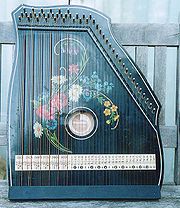 |
See also
- Guitar tuningGuitar tuningGuitar tunings almost always refers to the pitch of the open string, though some tunings may only realistically be attained by the use of a capo on an unmodified instrument....
- List of guitar tunings
- EvertuneEvertuneEverTune is a Los Angeles-based startup notable for inventing an award–winning mechanical device called the EverTune bridge which keeps strings in tune...
(mechanism to keep guitars tuned)
- Bass guitar tuningBass guitar tuningBass guitar tuning refers to the pitch adjustments carried out on the individual strings of an electric bass in order to achieve a prescribed arrangement of notes on the open strings....
- WA's Encyclopedia of Alternate Guitar Tunings
- Scale (string instruments)Scale (string instruments)In stringed instruments, the scale length is the maximum vibrating length of the strings to produce sound. In the classical community, it may be called simply "string length" or less often "mensure." On instruments in which strings are not "stopped" or divided in length like for example the...
or "Scale length"

